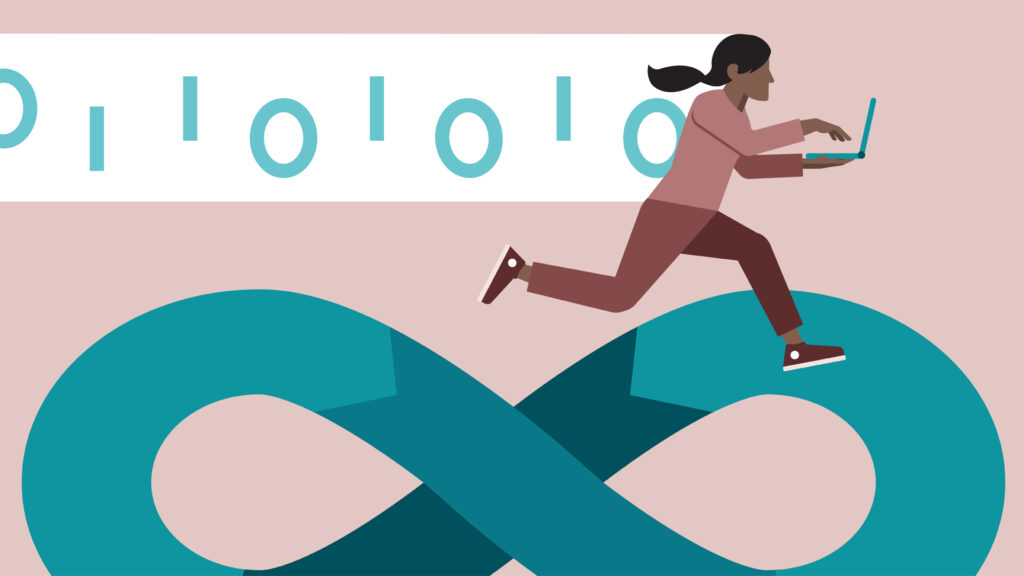
We live in an exciting time, but it’s also a challenging one. The digital landscape has transformed how we access information, connect with others, and engage in personal growth. At the same time, we’re dealing with increased isolation and an erosion of social support systems that could make it harder than ever to set healthy boundaries around our time and energy.
Balancing growth and well-being in this context requires a mindful approach to make the most of the benefits while avoiding the potential pitfalls.
Here are some key points to consider:
Embrace Continuous Learning

The digital age offers unprecedented access to educational resources, online courses, and informative content. Engaging in continuous learning can enhance your skills, knowledge, and personal development. Set aside dedicated time for learning and explore topics of interest to expand your horizons.
Learning is an ongoing process that should never end. From the moment you were born, you were absorbing information from the environment around you and using it to develop new skills and knowledge. This process continues throughout life as we learn new things every day. The more skills you have, the more opportunities are available to you—and learning is one of the most important ways we can improve ourselves as individuals.
Set Digital Boundaries
I know you want to be available for your friends and family, but sometimes there’s just too much to do, and you can’t get it all done in the same day. Or sometimes you just want to be offline and not thinking about work all the time. That’s why I recommend setting clear boundaries for your digital interactions. Designate tech-free zones, limit screen time, and prioritize in-person interactions to foster genuine connections.
And here’s something else: set boundaries with yourself! Don’t overload yourself with too many tasks at once—take a break when you need to, or delegate when it makes sense! And remember: it’s okay if you don’t respond right away—people will understand that life happens!
Prioritize Face-to-Face Interactions
While online connections are valuable, prioritize face-to-face interactions whenever possible. In-person conversations foster deeper connections and allow for more nuanced communication. Balance virtual networking with real-world socializing for a holistic approach to relationship-building.
You can’t beat the in-person experience when it comes to professional networking. While online connections are valuable, they don’t provide enough time for meaningful interaction—and that’s especially true if you’re trying to build relationships with people who work in different industries or live far away from you.
Not only does face-to-face interaction help you get to know your contacts better, but it also gives them a chance to ask questions about your business and learn more about what you do. In turn, this allows them to be more invested in the relationship and more likely to refer clients or colleagues who might be interested in what you offer!
Avoid the Comparison Trap

Social media can be a great way to stay connected with friends, family and acquaintances. But it can also be a breeding ground for unhealthy comparison. Don’t get me wrong: I love social media. It’s an amazing tool for connecting with people across the world and keeping up with what’s going on in their lives. But if you find yourself feeling bad about your own life by comparing it to someone else’s highlight reel—or even just feeling like you’re not doing enough—you’re falling into the comparison trap.
I believe that everyone has their own unique path to walk, and that no one is better than anyone else just because they have more followers or likes on social media posts. So focus on your own journey and growth, and don’t measure your worth against others’ highlight reels.
Regular Reflection
It’s important to take time out of your day to reflect on the way you’re using technology. If you’re like most people, you probably spend a lot of time on your phone or computer, and that can have a big impact on your overall well-being. You might be putting off eating healthy foods or getting enough sleep because you’re too busy looking at social media posts or playing games. But if you’re not careful, technology can also become an addiction—or even an escape from reality.
But there is a difference between being addicted to something and just enjoying it! You can enjoy your favorite apps, but it’s important to set limits for yourself so that they don’t interfere with other aspects of your life (like schoolwork). It’s also important that we all take some time for ourselves every week!
So how do we find the right balance between growth and maintaining our overall well-being? I recommend setting aside time every week for regular self-reflection. Assess your digital habits and their impact on your well-being, then adjust your approach as needed to ensure that you’re finding the right balance between growth and maintaining overall well-being.
In the end, it comes down to this: we can’t change the world, but we can change ourselves. We have the opportunity to use technology to enhance our lives and our society, but we also have the responsibility to think critically about how we use it. It’s up to us to make sure that as we move forward, we’re making choices that will help us achieve our goals—whatever those goals may be.
RUCHI RATHOR Founder & CEO
Payomatix Technologies Pvt. Ltd.
FOUNDER AND INVESTOR | PAYMENTS PROCESSING EXPERT | MERCHANT ACCOUNT SOLUTIONS | WHITE LABELLED PAYMENT GATEWAY | Dreamer, Creator, Achiever, Constantly Evolving
Website Ruchi Rathor: https://ruchirathor.com
Website Healing Heart https://thehealingheart.me/
Instagram https://www.instagram.com/ruchirathor/
LinkedIn https://www.linkedin.com/in/ruchirathor12/
Facebook https://www.facebook.com/ruchi.rathor.magnificient
Tumblr https://www.tumblr.com/blog/ruchirathor-thehealingheart
Medium https://medium.com/@ruchirathor_23436









